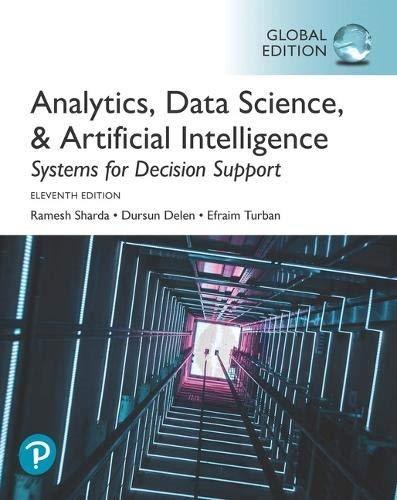From ticket sales to starting lineups, the Orlando Magic have come a long way since their inaugural
Question:
From ticket sales to starting lineups, the Orlando Magic have come a long way since their inaugural season in 1989. There weren't many wins in those early years, but the franchise has weathered the ups and downs to compete at the highest levels of the NBA.
Professional sports teams in smaller markets often struggle to build a big enough revenue base to compete against their larger market rivals. By using SAS® Analytics and SAS® Data Management, the Orlando Magic are among the top revenue earners in the NBA, despite being in the 20th-largest market.
The Magic accomplish this feat by studying the resale ticket market to price tickets better, to predict season ticket holders at risk of defection (and lure them back), and to analyze concession and product merchandise sales to make sure the organization has what the fans want every time they enter the arena.
The club has even used SAS to help coaches put together the best lineup.
"Our biggest challenge is to customize the fan experience, and SAS helps us manage all that in a robust way," says Alex Martins, CEO of the Orlando Magic. Having been with the Magic since the beginning (working his way up from PR Director to President to CEO), Martins has seen it all and knows the value that analytics adds. Under Martins' leadership, the season-ticket base has grown as large as 14,200, and the corporate sales department has seen tremendous growth.
The Challenge: Filling Every Seat
But like all professional sports teams, the Magic are constantly looking for new strategies that will keep the seats filled at each of the 41 yearly home games. "Generating new revenue streams in this day of escalating player salaries and escalating expenses is important," says Anthony Perez, vice president of Business Strategy. But with the advent of a robust online secondary market for tickets, reaching the industry benchmark of 90 percent renewal of season tickets has become more difficult.
"In the first year, we saw ticket revenue increase around 50 percent. Over the last three years-for that period, we've seen it grow maybe 75 percent. It's had a huge impact" said Anthony Perez, vice president of Business Strategy, Orlando Magic.
Perez's group takes a holistic approach by combining data from all revenue streams (concession, merchandise, and ticket sales) with outside data (secondary ticket market) to develop models that benefit the whole enterprise. "We're like an inhouse consulting group," explains Perez.
In the case of season ticket holders, the team uses historical purchasing data and renewal patterns to build decision tree models that place subscribers into three categories: most likely to renew, least likely to renew, and fence sitters. The fence sitters then get the customer service department's attention come renewal time.
"SAS has helped us grow our business. It is probably one of the greatest investments that we've made as an organization over the last half-dozen years because we can point to top-line revenue growth that SAS has helped us create through the specific messaging that we're able to direct to each one of our client groups."
How Do They Predict Season Ticket Renewals?
When analytics showed the team that 80 percent of revenue was from season ticket holders, it decided to take a proactive approach to renewals and atrisk accounts. The Magic don't have a crystal ball, but they do have SAS® Enterprise Miner™, which allowed them to better understand their data and develop analytic models that combine three pillars for predicting season ticket holder renewals:
• Tenure (how long had the customer been a ticket holder?).
• Ticket use (did the customer actually attend the games?).
• Secondary market activity (were the unused tickets successfully sold on secondary sites?).
The data mining tools allowed the team to accomplish more accurate scoring that led to a difference-and marked improvement-in the way it approached customer retention and marketing.
Questions for Case 7.4
1. According to the application case, what were the main challenges the Orlando Magic was facing?
2. How did analytics help the Orlando Magic to overcome some of its most significant challenges on and off the court?
3. Can you think of other uses of analytics in sports and especially in the case of the Orlando Magic? You can search the Web to find some answers to this question.
Step by Step Answer:

Analytics Data Science And Artificial Intelligence Systems For Decision Support
ISBN: 9781292341552
11th Global Edition
Authors: Ramesh Sharda, Dursun Delen, Efraim Turban





